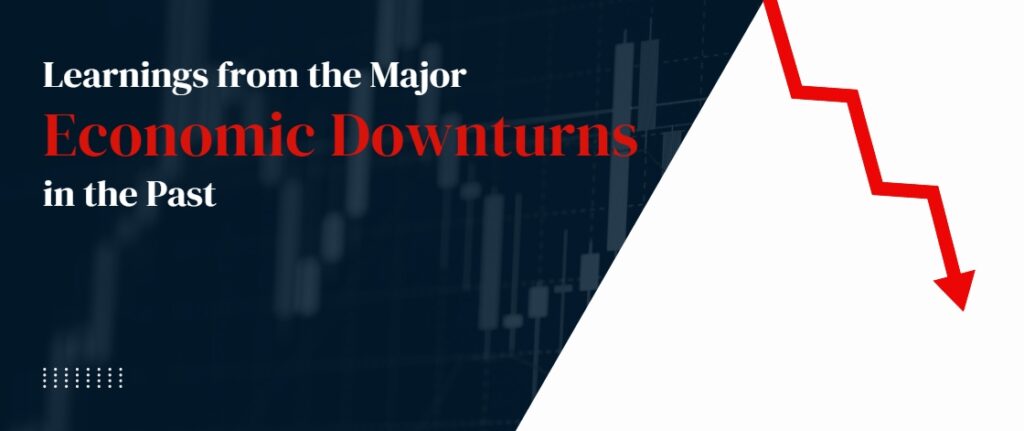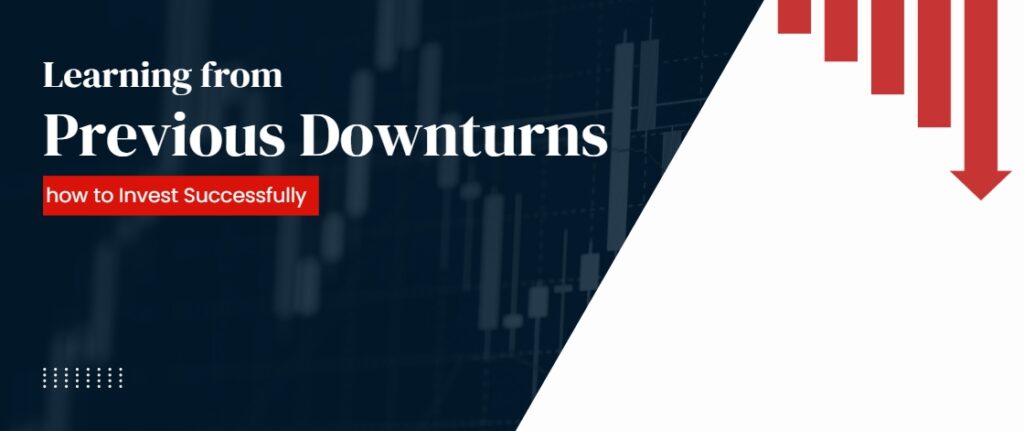
Recession is more than just a drop in the economy; it is a period of extended economic stagnation that results in reduced income, fewer profits, and greater unemployment rates. A recession’s consequences can be felt across the economy, from small enterprises to huge organizations and from the labor market to financial markets.
Many recessions have hit the global economy in recent decades, particularly the severe slump in 2008, which left an indelible impression on the investing landscape. Because of these economic downturns, investors have had to rethink their investment plans in light of the new economic realities. As the globe continues to deal with the fallout from past recessions, the need for investing methods that can survive market swings is more important than ever.
This article will look into the future of investing strategies in a post-recession environment and draw lessons from prior economic downturns to assist investors in making educated decisions.
We will start with the major economic downturns and their learnings.

Learnings from the Major Economic Downturns in the Past
The following are some possible lessons to be learned from previous major economic downturns:
- Diversity is Essential: A diverse investment portfolio is crucial during economic downturns. This can help to mitigate losses in one area while compensating for them in another. A varied portfolio of assets is one of the most typical suggestions from financial advisers to those managing the stock market. Having a diverse portfolio of investments and yields reduces the risk of financial distress caused by a failed asset. This is equally true for businesses and their clientele.
- Cash is king: Having a big cash reserve may provide a safety net for people and businesses during economic hardship. This can aid in weathering the storm and avoiding rash financial decisions. It is okay to utilize debt to enter a business, which might be a widespread practice. However, preserving cash and reducing debt as soon as possible is very important. Too much borrowing in an economic crisis is a problematic situation.
- Don’t freak out: Even though economic downturns are unpleasant and can lead to much anxiety, staying calm is important. It is important to remain calm and focused on long-term goals to avoid rash actions that may have negative repercussions.
- Adaptability is Essential: The ability to swiftly change and pivot can be critical in surviving an economic crisis. This may entail reconsidering corporate tactics, gaining new skills, or investigating new prospects.
- Collaboration is Valuable: During difficult economic times, collaborating with others and working together may be an advantage that will benefit both the parties. Resources and expertise can be shared among people and the economy at large, allowing people and the economy to save money and maximize their benefits.
The global economy has seen numerous severe economic downturns, including the 1930s Great Depression, the 1970s Oil Crisis, the early 2000s Dot-Com Bubble, and the 2008 Global Financial Crisis. While each of these downturns has its causes and results, they all share similar principles from which investors might be enjoying some benefits. So in the next section, we will learn how to invest successfully during a downturn.

Learning from Previous Downturns how to Invest Successfully
Investing during a downturn can be difficult, but there are useful lessons to be learned from prior downturns that can assist investors in making educated decisions. These are some tactics utilized by successful investors during previous market downturns.
- Diversify your Portfolio: Diversification is essential for any investor, especially during a downturn. Spreading your assets over several asset classes, industries, and geographies can assist in decreasing risk and losses. You may reduce the impact of a downturn in one asset class or location by diversifying your portfolio.
- Remain Invested: While selling your investments during a slump may be tempting, remember that the market tends to rebound over time. Market downturns have historically been followed by times of expansion, so selling off investments may result in lost profit opportunities. Remaining involved might help weather the storm and profit from the eventual rebound.
- Adopt a long-term Perspective: Successful investors recognize that investing is a long-term game. They stay focused on their investment objectives while remaining patient and disciplined through market downturns. A long-term perspective entails preparing for short-term volatility and not catching up in the market’s day-to-day changes.
- Keep Cash Reserve: A cash reserve can create a sense of security and assist you in avoiding making reckless investment decisions during economic instability. Having a cash reserve might also give you the flexibility to capitalize on opportunities during a downturn.
- Seek for Bargains: Market downturns can allow investors to purchase high-quality assets at reduced costs. Savvy investors look for deals and are ready to seize them when they appear.
Investing during a downturn can be difficult, but investors can position themselves for success by learning from prior downturns and taking a disciplined, long-term strategy.
We will analyze the challenges faced by investors in the current market.
If you need some ideas about what to read next, here they are:
- Analyzing the Changing Landscape of Stock Market Regulation
- SVB and Credit Suisse’s Failures: Lessons for Financial Institutions in the Current Economic Climate
- The Role of Family Members as Investors in Family Business: Strategies for Maximizing Returns and Minimizing Risks
- After the Silicon Valley Bank Crisis, European stocks declined as Deutsche Bank sparked another budget deficit

Challenges Faced by Investors in the Current Market
Investing in today’s market can be difficult, with various reasons leading to increased volatility and unpredictability. These are some of the present market’s problems for investors.
- Geopolitical Risks: Political insecurity, trade conflicts, and other geopolitical issues can influence financial markets and make investment more difficult. For example, uncertainty over the result of elections or trade talks can raise volatility and risk.
- Fluctuations in Interest Rates: It can influence the value of bond investments and other fixed-income assets. Investors must monitor interest rate fluctuations and alter their investment plans accordingly.
- Inflation: Increasing inflation can depreciate assets, particularly those in fixed-income securities. Investors must carefully analyze the impact of inflation on their holdings and make necessary adjustments.
- Market Sentiment: Investor mood and wider market sentiment may influence investing decisions. Fear, uncertainty, and pessimism may lead to market falls and sell-offs, while optimism can lead to a bull market.
Investing in today’s market can be difficult, with various reasons leading to increased volatility and unpredictability. Investors must monitor economic, geopolitical, and regulatory events and modify their investing plans appropriately.
Let us investigate the future of investing and its strategies.

Future of Investments Strategies
Several factors, like technology improvements, altering demographic patterns, and evolving investor preferences, are predicted to influence the future of investment strategy. Artificial intelligence and machine learning are expected to play a growing role in investment decision-making, risk management and portfolio optimization. Demographic changes, such as aging in many industrialized nations, are projected to open up new opportunities in healthcare and retirement planning. Shifting investor preferences, such as an increase in interest in socially responsible and impact investing, are also likely to impact investment methods. Investors must keep educated about these developments and adjust their investing strategies appropriately, focusing on diversification, risk management, and long-term value.
Getting expert financial guidance may also assist investors in navigating the continuously changing investment landscape and identifying possibilities for portfolio expansion and optimization.
Bottom Line
By learning from prior economic downturns, investors may plan for the future of investment techniques in a post-recession environment. The need to diversify one’s financial portfolio, keep cash reserves, avoid impulsive judgments, adjust to new conditions, and partner with others are key lessons from previous recessions. During market downturns, successful investors diversify their portfolios, stay committed for the long term, have cash reserves, look for bargains, and remain patient and disciplined. Notwithstanding the present market’s problems, especially geopolitical concerns, investors may position themselves for success by taking a long-term, disciplined strategy. Learning and analyzing past situations and taking action accordingly could help investors make wise decisions.
Join Our Newsletter
Elevate your financial game & join the ranks of elite investors with Secvolt’s exclusive newsletter.
Join Our Newsletter
Elevate your financial game & join the ranks of elite investors with Secvolt’s exclusive newsletter.
Don’t just dream of wealth; achieve it with Secvolt. Schedule a call today for personalized guidance on your investment strategy and join the ultra-successful.
Ready to unlock your wealth’s truest potential & cherish affluence?
Secvolt, our hedge fund, sets the bar high with a record-breaking performance of 262% returns in 2022. With the brilliance of our highly advanced quant models and the efficiency of our risk mitigation protocols, we are yet to see a loss!
We’re the perfect ally to help you succeed financially and build the lasting legacy you have always aspired for.
Get in touch today. YOUR LEGACY AWAITS YOU…





